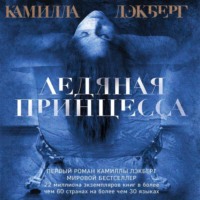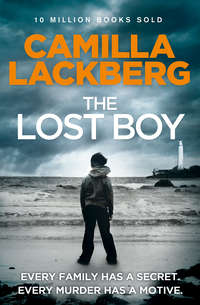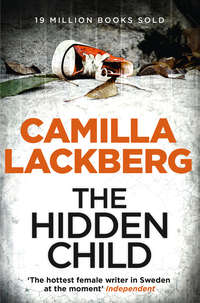
Полная версия
The Girl in the Woods
He was now part of a small group that included the man who had introduced himself as Karim, and Johannes Klingsby, a local builder whom Harald had hired whenever he needed renovations done at the bakery. They were moving slowly and resolutely through the woods as the sun broke through and the day brightened. The police officers in charge of the search had reminded them several times during the night not to hurry. It was best to make their way forward carefully and methodically.
‘We’ve been searching this area all night,’ said Johannes. ‘She can’t have gone this far.’
He threw out his hands.
‘Last time we spent twenty-four hours searching,’ said Harald.
Once again he pictured Stella’s body in his mind.
‘What?’ asked Karim in English, shaking his head. It was hard for him to understand Harald’s broad Bohuslän accent.
‘Harald was the one who found the dead girl in the woods, thirty years ago,’ Johannes explained in English.
‘Dead girl?’ said Karim, stopping. ‘Here?’
‘Yes. Four years old, same as this girl.’
Johannes held up four fingers.
Karim looked at Harald, who nodded quietly.
‘Yes. It was right over here. But there was water back then.’
He was ashamed of his poor English, but Karim nodded.
‘There,’ said Harald, pointing at the tree trunk. ‘It was not a big lake, it was a … the Swedish word is “tjärn”.’
‘A small lake, more like a pond,’ Johannes chimed in.
‘Yes, yes. A pond,’ said Harald. ‘A pond over there by that tree, and the girl was dead.’
Karim slowly walked towards the tree. He squatted down and placed his hand on the trunk. When he turned to look at the other men, his face was so pale that Harald took a step back.
‘Something is under the tree. I can see a hand. A small hand.’
Harald staggered back another step. Johannes leaned over a bush, and they soon heard him sobbing. Harald met Karim’s eye and saw a reflection of his own despair. They needed to call the police.
Marie held the script on her lap as she tried to learn her lines for the upcoming scene, but she couldn’t concentrate. The scene was going to be filmed indoors, in the big industrial warehouse in Tanumshede. Inside, they’d constructed a number of sets, almost like mini-worlds, ready for the actors to enter. For the most part, the rest of the filming would be done on location, on the island of Dannholmen. Ingrid Bergman had spent a great deal of time on the island when she was married to the theatre director Lars Schmidt. She’d carried on visiting Dannholmen long after she and Lars were divorced.
Marie stretched out her arms and shook her head. She wanted to be rid of all the thoughts that had started haunting her when people began talking about the missing girl. All those memories of a laughing Stella running ahead of her and Helen.
Marie sighed. She was here now, about to play her dream role. This was what she’d been working towards for so many years; it was the thing that had kept her going after the roles in Hollywood dried up. She’d earned this part, and she was a good actress. It didn’t take much effort for her to immerse herself in a role, pretending to be someone else; after all, she’d had plenty of practice, ever since she was a child. Lying or acting – there was so little difference between the two. She’d learned to master both early on.
If only she could stop thinking about Stella.
‘How does my hair look?’ she asked Yvonne.
The make-up artist approached nervously and came to such an abrupt halt she almost stumbled. She surveyed Marie from head to toe, then removed a comb stuck in the bun at the nape of her neck and smoothed a few stray strands of hair. She handed Marie a mirror and waited for her to inspect the results.
‘It looks fine,’ said Marie, and the tense, anxious look on Yvonne’s face vanished.
Marie turned towards the designated wardrobe area where Jörgen was arguing with Sixten, who was in charge of lighting.
‘Are you ready for me yet?’ she asked.
‘Give us another fifteen minutes!’ called Jörgen.
His frustration was obvious in his voice. Marie knew why. Delays cost money.
Once again she wondered how things were going with the finance for the film. This wasn’t the first time she’d worked on a film that started shooting before the money was in place, and on those previous occasions the plug had been pulled on the entire production. Nothing was certain until they passed the point when the film had already cost so much that it wouldn’t be feasible to stop. But they weren’t there yet.
‘Excuse me, but could I ask you a few questions while you’re waiting?’
Marie looked up from her script. A man in his thirties was looking at her with a big smile on his face. Obviously a reporter. Normally, she would never agree to an interview that hadn’t been scheduled in advance, but his skin-tight T-shirt showed off well-toned muscles that made her reluctant to dismiss him out of hand.
‘Sure, ask away. I’m only sitting here waiting.’
Thankfully, Ingrid had always been stylish, so the shirt she was wearing for today’s scene was particularly flattering.
The guy with the six-pack introduced himself as Axel, a reporter from Bohusläningen. He began with several banal questions about the film and her career before he got to what was clearly the purpose of the interview. Marie leaned back and crossed her long legs. The past had served her career well.
‘So how does it feel to be back here? Oh, I almost said “back at the scene of the crime”, but let’s call that a Freudian slip. Because you and Helen have always maintained your innocence.’
‘We were innocent,’ said Marie, noting with satisfaction that the young reporter couldn’t stop staring at her décolletage.
‘Even after you were found guilty of the crime?’ said Axel, making an effort to tear his gaze away from her chest.
‘We were children and completely incapable of committing such a crime, even though we were charged and convicted. Witch hunts still go on, even in this day and age.’
‘So what was it like for you, in the years that followed?’
Marie tossed her head. She would never be able to describe those years to him. He’d probably grown up with two perfect parents who helped him with everything, and he now lived with a significant other and their kids. She glanced at his left hand. A wife, not a significant other, she corrected herself.
‘It was … educational,’ she said. ‘I plan to write about it in detail in my memoirs some day. It’s not something I can describe in a few sentences.’
‘Since you mention your memoirs, I’ve heard that the local author, Erica Falck, is planning to write a book about the murder and about you and Helen. Are you cooperating with her? And have you and Helen approved the book?’
Marie hesitated before answering. Erica had contacted her, but she was in negotiations with one of the big book publishers in Stockholm regarding her own version of the story.
‘I haven’t yet decided whether to cooperate,’ she said, signalling that she had no intention of answering any more questions on that topic.
Axel took the hint and changed the subject.
‘I assume you’ve heard about the little girl who’s been missing since yesterday? From the same farm where Stella was living when she disappeared.’
‘A strange coincidence, but no more than that. The girl probably just got lost somewhere.’
‘Let’s hope so,’ said Axel.
He glanced down at his notebook, but at that moment Jörgen motioned for Marie. PR was great, but right now she wanted to go into the Dannholmen living room set and put on a brilliant performance. She had to convince the backers that this film was going to be a hit.
She shook hands with Axel, holding his hand a little longer than necessary as she thanked him for the interview. She began walking towards Jörgen and the rest of the team, but then stopped and turned around. Axel’s tape recorder was still rolling, and Marie leaned forward and in a hoarse voice spoke a few numbers into the microphone. She glanced at Axel.
‘That’s my phone number.’
Then she turned away and stepped into the 1970s, entering the set of the windswept island that had been Ingrid Bergman’s paradise on earth.
As soon as Patrik took the call from an unknown number, he knew this would be the news they’d been dreading. He listened to the voice on the other end of the line, then motioned to Gösta and Mellberg who were standing a short distance away talking to the dog handlers.
‘Yes, I know where it is,’ he said. ‘Don’t touch a thing. Not a thing. Wait there until we arrive.’
By the time he ended the call, Mellberg and Gösta had joined him. There was no need to say a word. One look at his expression told them all they needed to know.
‘Where is she?’ Gösta asked.
His eyes were fixed on the farmhouse where Nea’s mother was standing in the kitchen making more coffee.
‘The same place where the other girl was found.’
‘Bloody hell!’ said Mellberg.
‘But we already searched that area. Several groups have searched it,’ said Gösta with a frown. ‘How could they have missed her?’
‘I don’t know,’ said Patrik. ‘That was Harald on the phone – the man who owns Zetterlind bakery. It was his group that found her.’
‘The same guy who found Stella,’ said Gösta quietly.
Mellberg stared at him.
‘That’s quite a coincidence. What are the odds that the same person, after a thirty-year gap, would find a second murdered little girl?’
Gösta waved his hand dismissively.
‘We checked him out the first time, but he had an airtight alibi. He had nothing to do with the murder.’ He looked at Patrik. ‘Because this is murder, right? Not an accident? Considering that she was found at the same spot, it seems more than likely we’re talking about murder.’
Patrik nodded.
‘We’ll need to wait and see what the techs say, but Harald said she was naked.’
‘Bloody hell,’ said Mellberg again, his face turning pale.
Patrik took a deep breath. The morning sun had begun its climb upward, and the temperature had already risen so much that his shirt was sticking to his body with sweat.
‘I suggest we split up. I’ll go and meet Harald at the site where the girl was found. His group is waiting there. I’ll take some crime scene tape with me and cordon off the area. Bertil, ring Torbjörn in Uddevalla and ask him to come out here as fast as possible with a forensic team. When the search parties get back here, tell them the search has been called off. We don’t want any volunteers going out searching again. And tell the dog handlers and the helicopter pilots they can stop looking. Gösta, could you …’
Patrik fell silent, giving his colleague a troubled look.
Gösta nodded.
‘I’ll do it,’ he said.
Patrik didn’t envy him the task. But it was only logical for him to ask Gösta to do it. He’d had the most contact with Nea’s parents, and Patrik knew he would be able to deal with the situation.
‘And ring the pastor too,’ said Patrik. Then he turned to Mellberg. ‘Bertil, go get Nea’s father as soon as he comes back with his group, so he doesn’t hear the news before Gösta has a chance to speak to him.’
‘That won’t be easy,’ said Mellberg, grimacing.
Beads of sweat had formed on his upper lip.
‘I know. The news is going to spread like wildfire, but do your best.’
Mellberg nodded. Patrik left his colleagues and headed for the woods. He still couldn’t understand it. The place where Stella had been found thirty years ago had been the first location they’d searched. Yet somehow they had missed her.
After walking for ten minutes he caught sight of the three men who were waiting for him. In addition to Harald, there were two younger men, one of whom looked like a foreigner. Patrik shook hands and greeted them. Not one of them wanted to meet his eye.
‘Where is she?’ he asked.
‘Under the big tree trunk over there,’ said Harald, pointing. ‘That’s why we didn’t see her at first. There’s a hollow space underneath, and someone stuffed her body into it. You can only see her if you go close and move the tree trunk.’
Patrik nodded. That explained it. But he cursed himself for not giving the order to search the area more thoroughly.
‘You know she’s back, right? For the first time since she was sent away.’
Patrik didn’t have to ask who Harald meant. Everybody in town was aware of Marie Wall’s return, especially since she’d come back under such dramatic circumstances.
‘Yes, we know,’ he said without speculating any further about what her return might mean.
But the thought had already occurred to him. It was certainly a strange coincidence, to say the least: no sooner had Marie returned than another little girl from the same farm turned up murdered, in the exact same spot where Stella was found.
‘I’m going to cordon off the area, and in a while our forensics team will inspect the crime scene.’
He set down the bag he was carrying and took out two big rolls of blue-and-white police tape.
‘Should we go back?’ asked the younger man, who’d introduced himself as Johannes.
‘No, I’d like all of you to stay. Try not to move around too much. The techs will want to examine your clothing and shoes, since you’ve been walking around the crime scene.’
The man who seemed to be a foreigner looked puzzled. Harald turned to him and said in halting English:
‘We stay here. Okay, Karim?’
‘Okay,’ said the man with a nod. Patrik realized he was one of the men Rolf had brought from the refugee centre.
No one spoke for a few minutes. They were all struck by the surreal contrast between the reason for their presence and the idyllic surroundings. The birds carried on chirping merrily, as if nothing had happened, as if the dead body of a four-year-old girl wasn’t lying just metres away. The birdsong was accompanied by the rustle of the gentle breeze in the treetops. At this time of day, with the sun’s rays penetrating the trees to light the glade where they stood, it was heartbreakingly beautiful. Patrik’s gaze settled on a patch of chanterelles. Under normal circumstances, his heart would have leapt with excitement at the prospect of harvesting a few to take home. But right now picking mushrooms was the furthest thing from his mind.
Patrik began unwinding the tape. The only thing he could do for the little girl was to carry out his job to the best of his ability. So he worked in silence, and tried to avoid looking at the tree trunk.
Eva was standing at the sink, rinsing out the coffee pot. She’d lost count of how many pots she’d made during the night. The sound of someone quietly clearing his throat made her turn around. When she saw the look in Gösta’s eyes and his tense posture, the coffee pot slipped out of her grasp. The sound of breaking glass was instantly followed by a scream that sounded so close, yet so far away. A scream of grief and loss beyond all comprehension.
The scream came from her own lips.
She fell into Gösta’s arms. His hold on her was the only thing keeping her from collapsing. She gasped for breath as Gösta stroked her hair. She wished Nea was here, laughing as she ran around the room. She wished Nea had never been born, wished she’d never produced a child who would then be taken from her.
Now all was lost. Everything had died with Nea.
‘I’ve notified the pastor,’ said Gösta, leading her over to a kitchen chair.
He must see how broken I am inside, thought Eva, since he’s treating me so carefully.
‘Why did you do that?’ she asked, genuinely confused.
What could a pastor do for her now? She’d never had a strong religious faith. And a child should be with her parents, not with some god up in heaven. What could a pastor say that she and Peter would find the least bit consoling?
‘Peter?’ she said, her voice sounding parched and brittle.
Even her voice had died with Nea.
‘They’re looking for him. He’ll be here soon.’
‘No,’ she said, shaking her head. ‘Don’t do it. Don’t tell him.’
Let him stay out there in the woods, she thought. Let him still have hope. Peter was the only one left now. She had died with Nea.
‘He has to be told, Eva,’ said Gösta, putting his arm around her again. ‘There’s no way to avoid it.’
Eva nodded as she leaned against Gösta. Of course Peter couldn’t keep wandering through the woods like some kind of forest creature. They had to tell him, even though that would mean he too would die.
She pulled away from Gösta and leaned forward to lay her head on the table. She’d been awake for twenty-four hours. Hope and fear had kept her going. Now all she wanted was to sleep and escape everything. Pretend it was all a bad dream. Her body relaxed, the wooden tabletop felt as soft as a pillow under her cheek. She slipped further and further away. A warm hand was cautiously patting her back. Warmth spread through her body.
Then someone came in the front door. She didn’t want to open her eyes. She didn’t want to see Peter standing there. But Gösta gave her shoulder a squeeze, and she had to do it. She looked up and met Peter’s gaze, which was just as shattered as her own.
BOHUSLÄN 1671
The cow named Stjärna had recovered by the time Lill-Jan went to see to her the next morning. Preben said nothing to Elin about it, but he looked at her with new interest. She felt him watching her as she prepared breakfast. Britta had been in an unusually good mood when Elin helped her sister to dress. But she was always happiest on Sundays. She loved sitting at the very front of the church during the services, wearing her best clothes and with her hair beautifully coiffed. She loved seeing the pews fill with the members of Preben’s congregation.
It was not a long walk from the vicarage to the church, and the servants went as a group. Preben and Britta had gone ahead in the horse-drawn wagon so Britta’s fine clothes would not be soiled by muck and mire.
Elin held Märta’s hand in a tight grip. The girl scampered more than she walked, and her blond plaits bounced against the back of the old cloak she wore. It was freezing cold, and Elin had carefully stuffed paper inside Märta’s shoes to keep her feet warm and dry, but also because the shoes were hand-me-downs from one of the maids whose feet were much bigger. But Märta did not complain. Shoes were shoes, and she had already learned to be happy with what she had.
Elin’s heart lifted when she saw the church looming before them as they reached Vinbäck. The newly built tower was a stately sight, and the metal roof gleamed in the winter sun. A cemetery wall made of red-painted planks surrounded the church, and there were three big brick entrances with roof tiles, and iron gates to prevent livestock from wandering into the cemetery.
Merely stepping inside the churchyard made Elin’s heart sing, and when they entered the church itself she took a deep breath and allowed the silent atmosphere to seep inside her.
She and Märta took seats at the very back. There were forty-eight pews in all, but lately they were never filled. The crowds of people who had once flocked to the coastal area during the great herring era a hundred years earlier were now only a memory. Elin’s maternal grandmother had told her about the old days, recounting stories she had heard from her own parents and grandparents. Back then, everything had been different. The herring was so abundant they hardly knew what to do with all the fish, and people had come from all over Sweden to settle in the area. But the herring had disappeared and war and famine had depleted the land. Now only the stories remained. And many pews stood empty, while the rest were occupied by the listless, pale, and gaunt residents of Bohuslän. Looking at their faces, Elin saw a defeated people, devoid of hope.
The church had windows only on the south wall, but the light streaming in was so lovely that she felt tears well up in her eyes. The pulpit was also on the south side. The murmuring among the congregation faded as Preben climbed the stairs to the pulpit.
The service began with a hymn, and Elin put extra effort into the song, as she usually did, since she knew she had a beautiful singing voice. It was a small vanity she allowed herself because Märta loved to hear her sing.
She tried hard to understand what Preben was saying. Swedish was the only language permitted in the church, both for the sermon and the prayers. This was a great burden for most members of the congregation, since they were more accustomed to speaking Danish and Norwegian.
But he had a lovely voice. Elin closed her eyes and immediately felt the warmth of Preben’s hand. She opened her eyes and forced herself to stare at the back of Britta’s head, at the very front of the church. Britta wore her hair in a beautiful plait that Elin had fixed for her that morning. The white collar of her dress was freshly starched. She was nodding as Preben preached.
Elin forced her thoughts away from the sound of Preben’s voice and the memory of his hand touching hers. He was Britta’s husband, yet she was sitting here in God’s house thinking these forbidden thoughts. It would come as no surprise if lightning struck the church and killed her on the spot, as punishment for her ungodliness. She squeezed Märta’s hand and made herself listen, trying to understand the words issuing from the pulpit. Preben was talking about the great turmoil spreading across their kingdom and their parish, and about their countrymen who were carrying on a brave fight against the devil by seeking out his envoys and bringing them to trial. The congregation listened as if mesmerized. The devil was as much a part of their daily lives as God was. Satan was omnipresent – danger lurked in the eyes of cats, in the ocean deep, in the raven perched in the tree. Satan was as real as a father or a brother, or the neighbour living next door. The fact that the evil one could not be seen by the naked eye made him even more dangerous, and constant vigilance was required.
‘So far we have been spared,’ said Preben, his voice resounding so beautifully between the stone walls. ‘But it is only a matter of time before Satan sinks his claws into children and women in our little corner of the world as well. So I beseech you to be watchful. The signs will be evident. Keep God’s watchful eye on your wife, your daughter, your maids, your neighbour, your mother-in-law, and your sister. The sooner we find these brides of the devil who dwell among us, the sooner we can strike back and prevent Satan from claiming a foothold here.’
Everyone nodded, an agitated rosy flush appearing on their cheeks. Any of the children who sniggered received a sharp poke in the side, a tug on their hair, or a box on the ear.
The rest of the church service was over much too soon. It was a break from the daily routine, a time for everyone to rest and turn their attention to the needs of their soul.
Elin stood up and took a firm grip on Märta’s hand so she would not get lost in the crowd of people all trying to leave at once. When they stepped outside, she shivered in the cold.
‘Pox upon you!’ a voice cried behind her.
Elin turned in surprise, but when she saw who had cursed her she lowered her eyes. It was Ebba of Mörhult, the widow of Claes who had perished along with Per and the others on the fishing boat. Ebba was one of the reasons she had not been able to stay in Fjällbacka but had been forced instead to accept Britta’s offer. Ebba’s hatred towards her knew no bounds, since she blamed Elin for what happened. And Elin knew why the woman felt that way, even though the words she had called to Per on that fateful morning had not caused the boat to sink. Elin’s words had not drowned Per and his men; it was the fault of the storm that had suddenly overtaken them.
Yet things had not gone well for Ebba after Claes died, and she blamed her misfortune on Elin.
‘Ebba, not on the church grounds, not on sacred soil,’ Helga Klippare admonished her younger sister, drawing her away.









